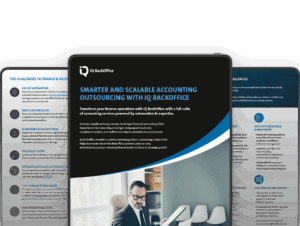
Introduction
At a time marked by technological advancements, where computers seek upgrades and mobile phones get updates, businesses must also improve current work systems for efficient changes and enhanced capabilities. Indeed, some companies have embraced significant technological transformations since, in the last decade, there has been an emphasis on data-driven decision-making, agility and flexibility, and a shift towards more outcome-based management.
This transition is relevant in many areas of a company’s operations. For our purposes, however, let’s put the focus on accounting and cite the change from manual to digital accounting systems as the pivotal example.
While manual accounting has its roots in traditional practices, it comes with its fair share of challenges. As previously reported, some 89% of small to medium-sized businesses still process invoices using traditional and paper-based methods.
As some businesses continue to rely on the perceived benefits of this tedious paper-based method, let’s explore the real challenges of having a manual accounting system and highlight the benefits of embracing modern accounting technology.
Time-Consuming Data Entry
One of the most apparent challenges of manual accounting is the sheer amount of time it consumes. This basic process of recording financial transactions, whether ledgers or spreadsheets, can be tedious and labor-intensive. Accountants spend hours upon hours crunching numbers, cross-referencing receipts, and meticulously filling out spreadsheets inputting data, which could be better spent analyzing and interpreting financial information. Traditional accounting is a notorious time hog, leaving you with little room for the strategic thinking and innovation your business needs.
Transitioning to a financial process automated system allows quicker data entry through data import features, reducing accountants’ time on routine tasks. It also takes your traditional paper-based processes into the modern era by digitizing, streamlining, and reengineering them while gaining best practices and tight controls. This faster process enables them to focus on more value-added activities like financial analysis and strategic planning.
Increased Risk of Human Error
Paper-based accounting systems are prone to human error, and this risk multiplies as the volume of financial data grows. Mistakes in data entry, calculations, or ledger postings can lead to discrepancies in financial statements and, in worst cases, legal repercussions. Whether it’s a misplaced decimal point, a transposed number, or a sneaky typo, accounting errors can slip into your financial records faster than you can say “reconciliation.”
Conversely, modern accounting software reduces the risk of error by automating calculations and cross-referencing data. It also provides validation checks to flag potential inaccuracies, contributing to more accurate financial reporting.
Limited Accessibility and Collaboration
Traditional accounting often requires physical access to accounting records, which can be problematic in an increasingly remote and digital business environment. Collaboration among accountants, auditors, and other stakeholders may be hindered and limited – as updated financial data might not be accessible to all relevant parties due to geographical limitations, especially in a remote model. It also lacks the structure to provide quick, accurate, and insightful analysis, making strategic decisions daunting.
Now, imagine the unthinkable: a key member of your accounting team decides to embark on a new adventure and leaves the company. With a manual system, their departure could leave your operations in turmoil, with knowledge gaps and a scramble to pick up the pieces.
In contrast, digital accounting systems offer the advantage of cloud-based solutions, which allow multiple users to access financial data – offering financial visibility from anywhere with an internet connection. This convenience enhances collaboration and ensures all stakeholders work with the most up-to-date information.
Difficulty in Tracking Changes
When changes or updates are made in a paper-based accounting system, tracking those changes can take time and effort. The lack of version control makes auditing the history of financial transactions challenging, potentially leading to disputes and difficulties in accountability.
Modern accounting software maintains an audit trail, providing a complete history of every financial transaction and any modifications made. This transparency is invaluable for regulatory compliance and dispute resolution.
Limited Scalability
Manual accounting systems may suffice for small businesses with minimal transactions. However, as a business grows, so does the complexity of its financial operations. Basic accounting processes often need help to handle the increased volume of transactions, which can result in inefficiency and the need for additional resources.
Digital accounting systems, on the other hand, are highly scalable, adapting to the evolving needs of a business. They can handle vast amounts of data and provide financial analysis, forecasting, and budgeting tools, supporting a business’s growth and development.
Compliance Challenges and Audit Anxiety
Audit and Compliance with financial regulations and reporting standards is essential for businesses of all sizes. Scouring through stacks of paperwork to meet audit and compliance standards can make even the calmest accountant break out in a cold sweat. The risk of inaccuracies and legal complications looms large. A paper-based accountant may need help to keep up with ever-changing rules and are more susceptible to errors in compliance reporting.
Modern accounting software frequently updates to align with regulatory changes, making it easier for businesses to stay compliant. It can automate compliance checks and generate reports that adhere to the latest standards, reducing non-compliance risk.
Inefficient Financial Analysis
Manual accounting systems may need more tools and capabilities for in-depth financial analysis. Extracting meaningful insights from financial data can be laborious and time-consuming, limiting a business’s ability to make data-driven decisions.
Digital accounting systems provide features for quick and accurate financial analysis. They generate reports, graphs, and visual representations of financial data, empowering businesses to make informed decisions and strategic plans.
Conclusion
While manual accounting systems have a place in history and may work for small businesses with limited transactions, they present a host of challenges that modern growing companies today with large volume transactions can no longer afford. Yet, as we confront these challenges, we find ourselves at a point of transformation. The future of accounting is a promising landscape shaped by the dynamic fusion of human expertise and digital precision. This landscape is evolving, and businesses must adapt to stay competitive. Embracing technology and transitioning to digital accounting systems can be a pivotal step toward a more streamlined, accurate, efficient, and error-free financial operation. By acknowledging the limitations of manual systems, we embrace the need for change. Transitioning to automated, digital accounting systems opens doors to opportunities previously untapped. It not only helps businesses overcome the challenges of manual accounting but also positions them for success in an already highly dynamic business environment. These systems empower us to redirect our time from data entry to strategic thinking, from error correction to creative problem-solving.
As we bid farewell to the constraints of the past, we enter a realm where accessibility and efficiency are seamlessly integrated into our financial workflows. If the business landscape is going to change anyway, why not equip yourself with tools that can propel your business forward rather than hold it back? It’s time to bid farewell to the past challenges and usher in a new era of efficiency, accuracy, and growth. You and your business deserve it!
Leveraging Outsourced Accounting Services for Business Growth: FAQs
Are You Considering Outsourcing Your Accounting Functions? IQ BackOffice Can Help.
Here at IQ BackOffice, we provide financial business process outsourcing for large and mid-sized enterprises. We serve a range of diverse industries, including manufacturing and distribution, healthcare and dental, restaurant and hospitality, energy, retail, and technology. Our solutions enable companies around the globe to automate and streamline the complex financial processes they manage.
IQ BackOffice reengineers financial processes to take advantage of best practices and leverage state-of-the-art automation. This allows us to remove manual or inefficient steps, delivering improved controls and up to 70% cost savings for our clients.
To find out more about how IQ BackOffice can reduce costs and streamline your Accounts Payable function, get in touch with us.
Read More about IQ BackOffice offerings:
How Can Outsourcing Accounting Make Accounting Departments More Efficient?
Is it Time for your Company to Consider Outsourcing Financial Operations?
The Future of Business Payments – 5 Post-Pandemic Best Practices
Business Process Outsourcing, and a Closer Look at Accounts Payable
Accounting Automation and Outsourcing – Top 5 Rookie Mistakes
What is AP Automation and Does It Work On It’s Own?
Outsourcing Accounting Processes – Does It Actually Save Money?







